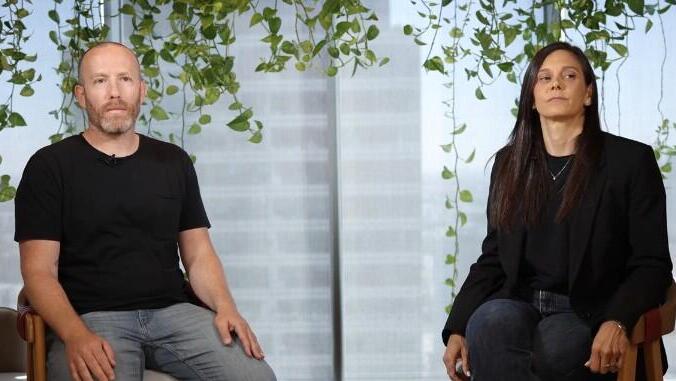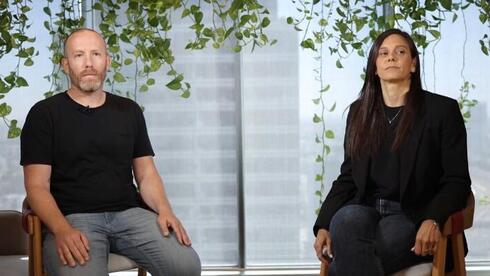
"The opportunity to help customers has changed dramatically because of AI"
Yuval Kesten, CPO at HoneyBook, was speaking at Google and Calcalist’s Startup Week. "We understood where our customers spend most of their time using the product and where AI can help them."
"Two years ago, when things started happening in AI but were still in their early stages, we realized that we needed to focus on our audience - we know their needs and know what hurts them. Their needs in running a business do not change because of AI. The opportunity to help them has changed dramatically because of AI," said Yuval Kesten, CPO at HoneyBook, in a conversation with Maya Henkin, Director, Product Solutions & Partnerships at Google Israel, as part of Google and Calcalist’s Startup Week.
How did you approach the task of thinking about your product strategy amidst all the rapid changes in the world of AI?
"What we did was, instead of starting with a chatbot on the side that was disconnected from the rest of the platform and the rest of the product, we started building a lot of features that were really embedded within the existing flows of the system. We understood where our customers were spending most of their time using the product. Where AI could help them, even then at the beginning, was around writing text and summarizing text, and we just built feature after feature, until within two years we reached a place where the vast majority of our users were using AI features at least once a month, many of them once a week, and a considerable number of them were using AI features once a day."
Yuval, tell us a little more about HoneyBook, the path you've taken, and what your focus has been on in the last two years.
"HoneyBook started about 12 years ago, and our vision has always been to empower and help small businesses, especially service providers. The way we do this is to first take away all the exhausting, repetitive, and uninteresting work of running the business. Let them focus on their craft and let them focus on their customers, and we'll do the rest for them. In the last two years, we've really realized, with the start of all the big language models and chatbots of all kinds, that we have a huge opportunity here to actually just do more than we've always done - help them improve their productivity, help them make decisions, and we've started building more and more features and giving them more value based on generative AI."
Everyone who lives in the technological world sees non-stop launches from the big companies. We at Google also announce quite a few new language models, new video tools, and every day an even newer model comes out, with more sophisticated capabilities. How do you deal with this influx of technological innovations on the one hand, and on the other, the need to build a product over time? And add to all of this, this also ultimately changes the behavior of users, consumers, and your customers. And we at Google too, when we look a little at changes in the world, we see very big changes in consumer behavior. So how do you deal with all these changes, and still bring your customers a new enough product that meets their needs?
"What we did in light of all the changes, on the one hand, was stay very focused on solving problems for customers here and now. But still, some of the people in the company, mainly people with a very deep background in data science, but also product and production people, and basically anyone who has a lot of passion for the field, constantly followed what was happening. As we saw our users' trust increase in AI in general and in HoneyBook AI in particular, the more they used us and the more they trusted us with things. And as the technology developed, we actually raised the bar for the types of problems that we are trying to help solve for them. For example, a problem like helping with pricing a service. This is a problem that every small business that provides services has. They don't know what price to give for each service they provide. Two years ago, when we started, we wouldn't have dared to do it at all. Both because the technology wasn't there and because the users' trust wasn't there yet. Today, it's already something we do and use and love."
Related articles:
How do you end up being competitive against all the companies with new features coming out for your audience? How do you stay competitive?
"The first thing is focusing on our specific audience. Our audience is indeed large and the market is very large, both in the United States and certainly in the world. But it is very focused - service providers, small businesses, people who are involved in all the details of their business, even if there is a small team working with them. And this focus on a very specific audience, and our 12-year acquaintance with this specific audience, allows us to really tailor the most precise solutions for them, who are also the most sensitive to the things that are important to them. For example, it is very important for our type of audience to be in control. So we will use AI and automation to prepare for them all the things they need. In the end, they will always click the button that sends that email to the customer or performs the action. That is what they ask of us and that is what we do, because we are focused.
"For example, one of the things that is specifically important to our audience is the personal connection with their customers. This is not true for every service center, for example, of a large company, and it is not true for all businesses in the world. But in the businesses that HoneyBook serves, the personal contact with the customer and the future customer is, of course, no less important. We will help, we will prepare them for the meeting, we will arrange a meeting for them, we will prepare them and everything they need to do, but whoever will meet the customer is not some bot and it is not some agent. Whoever will meet the customer is the business owner."
